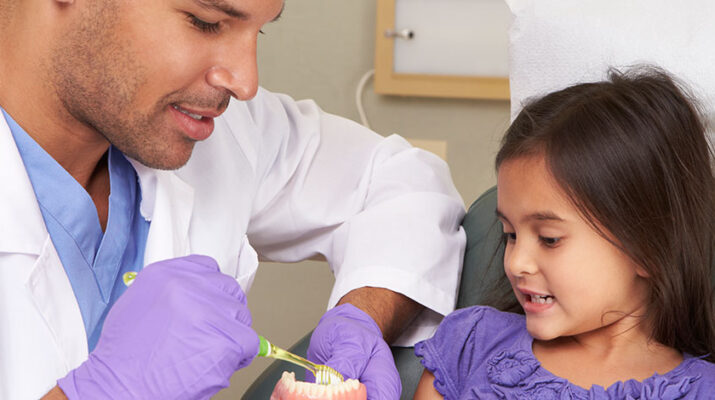Adults can help promote good dental health among children
By Deborah Jeanne Sergeant
In a sense, dentists treating children see two patients with each visit: the child and the accompanying parent. While the dentists treat the child, the parent receives dental education to improve home care. Several issues consistently come up during these visits.
Amanda Dotterman, dental hygienist at Advanced Dental, PC, in Niagara Falls, wants parents to watch their children’s snacking more closely. While avoiding sugary snacks makes sense, noshing on Goldfish crackers or Cheerios all day is not a great idea, either.
“Goldfish and Cheerios break down into sugars,” Dotterman said. “If they’re snacking on this all day, it’s an acid attack on their teeth. Fruits, vegetables and things that aren’t carbs are better. Even with sugar, it’s better to do it all at once so your teeth have a time buffer to re-mineralize.”
Parents should offer one portion for five minutes. If it is not finished, the remainder of the portion should be taken away.
For children who frequently claim they are hungry, parents should remain strict about eating times. Many times, it is just boredom or thirst instead of hunger.
It takes about 30 minutes for saliva to reduce the acid in the mouth. However, a drink of water can help.
Dotterman also cautions parents about allowing children to sip beverages all day (unless it is water).
“Especially for young children, keep sugary drinks to a minimum,” she said.
That includes natural sources of sugar, such as unsweetened fruit juice. While more healthful than sugar-sweetened beverages like juice cocktail, sports drinks and energy drinks, it still contains acid that breakdown the teeth.
“Keep it to four ounces of juice per day, maximum, all at once or at mealtimes is better,” Dotterman said. “Water is the best choice.”
She also reminds many parents to have their children wear a mouthguard for sports beyond just football and lacrosse. A collision with other players, equipment like the net or ball, or falling during play can endanger teeth.
“If you forget to grab the mouthguard, one from the drugstore is OK for a day or two,” she said. “Long-term, you want a custom one that your dentist can make you. That is the best. The ones from the drugstore are softer than the one your dentist would make.
“If anything ever happens and a tooth falls out, put it in a glass of milk and run to the dentist.”
Children can use a face shield on their sports helmet if applicable.
One aspect of home care that many parents overlook is flossing. Stuffing large hands into tiny mouths is challenging. However, Dotterman said that using floss picks may make it easier.
“Once the teeth in the back are touching, you want to start flossing, whether a parent is helping or a parent is supervising,” she added.
In addition, children should begin seeing the dentist by 1 year of age. That is the most important aspect of improving children’s oral health, according to Peter DeMarco, dentist, professor and head of the department of dental lab technology at SUNY Erie in Orchard Park.
Dentists can help children and parents learn proper home care, which DeMarco said starts with brushing.
“It’s very important to start brushing the child’s teeth as soon as the first tooth comes in,” he said. “The parents should brush the child’s teeth with fluoride toothpaste the size of a grain of rice until age 3. From ages 3 through 6, use a pea-sized amount.”
Parents should help their children brush until age 7 or when their manual dexterity is sufficient to do a good job. Otherwise, it is easy for children to miss spots.
“A lot of people don’t realize that your first adult teeth come in around age 6,” DeMarco said. “It’s a molar that is never replaced. Parents should not ignore the health of baby teeth. If there’s a cavity, it can damage the underlying adult tooth.”
Around age 6 or so, children may be capable of brushing their own teeth; however, their parents should always supervise.
Tiffany Jadoo, board-certified pediatric dentist with Winning Smiles in Amherst, advises patients to brush at least twice per day. Ideally, they should brush three times daily.
“Brushing after lunch is good as well. However, most children are not able to do so at school,” Jadoo said. “Rinsing the mouth with water can help reduce the bacteria load after lunch. Drink water throughout the day. It helps wash whatever you’re eating off your teeth.”
Brushing before bedtime is also important, as well as flossing at that time since saliva flow lessens at night.

